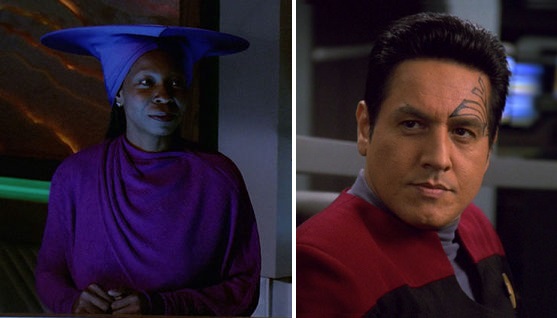Writing dialogue is not one of my strengths as a writer. I often struggle to give my characters their own voices. So I have a stupid trick to help me get the voice right for characters I’m going to spend a lot of time with: When thinking of their dialogue in my own head, I give them a distinctive accent, tone, or speaking style. It doesn’t always come through onto the page, but it helps me think about how a particular character would talk.
For an example, here’s how I wrote the voices for the main characters in my story “How I Saved Athens from the Stone Monsters.”
The story is about Mnestra and Lampedo, two flute girls working the streets of Athens who get caught in the chaos when the rich, ambitious aristocrat Alkbiades uses a mysterious artifact to make the city’s statues come to life and go on a rampage. To make the story work, it was important to convey the personalities of these three key characters.
Mnestra, as narrator of the story, was the most important to get right. I wanted her to come across as self-possessed, confident, and a little snarky. I also wanted her to feel accessible as a character, someone we felt like we knew. With a story set so far in the past, there was a danger that the characters would feel distant and hard to identify with. Mnestra’s world is certainly not like our own, even before the monsters appear. I wanted to close that gap and make her feel real. There’s also a long history of ancient Greek and Roman characters in modern fiction written as if they were stiff upper-class Brits (in no small part because Greek and Roman literature was for a long time a crucial part of upper-class British education). I didn’t want Mnestra to sound like that.
So when I was thinking about her lines, I thought of her as a jaded teenager. I wrote the first few sentences of the story almost before I really knew where the plot was going, just to make sure I had Mnestra’s voice down.
Okay, so that thing with the statues? The smashed penises thing? That was my idea. But let me explain. I had a good reason for it.
She’s a little overly blasé and vague like a teen trying to play it cool. She leads into the story gradually, like a high schooler with a bent fender sidling up to a freaked-out parent.
In the first draft of the story, there was a lot more of Mnestra’s attitude throughout, but in revising, I found that I didn’t need all of that, and in fact once the action picked up later, it just slowed things down. I edited out most of it, but kept a few sarcastic asides in where they felt appropriate.
Lampedo was a different problem. Her character changed a lot as I was writing. I originally wrote her as shy and delicate, but some good editorial feedback made me rethink her relationship to Mnestra. I rewrote the pair to be less “surrogate sisters” and more “buddy cops,” which gave the story more to work with. Lampedo instead ended up being tough and prickly.
I had a hard time writing the new version of Lampedo’s voice until I started thinking of her with a Russian accent. Not just a Russian accent but a Russian attitude: proud, prematurely world-weary, fatalistic. Here’s a little dialogue between Mnestra and Lampedo after they first get away from the attacking statues.
“Isis’ milk!” I hissed at her. “What did you think you were doing, trying to fight those things?”
“A warrior always attacks,” she answered, grabbing a wine jug. She pulled out the cork with her teeth and drank a big glug.
“We’re not warriors!” I snapped. “We’re flute girls. Don’t you get that? We have to be smart.”
“You say ‘smart,’” she scoffed. “You mean weak.”
“Have you ever seen an old flute girl?” I asked her. “No, there aren’t any. Most of us end up as graveyard women spreading for scraps. You only get through if you have a plan.”
“What’s yours?” she asked. “Hide in a storeroom?”
Alkibiades was a different challenge. Alkibiades is an aristocrat, and his driving motivation in my story (as in history) is that he feels he has never been shown the respect that his status entitles him to. Unlike with Mnestra, I leaned hard into the “stiff upper-class Brit” mode with him to convey that not only is he of a much higher social class than the flute girls but he’s also to an extent putting on an act of what he thinks an Athenian aristocrat should be like. If you can imagine a sinister version of Bertie Wooster, that’s what I heard in my head when writing his lines. Here’s how he intervenes when some potential clients are threatening to get violent with Mnestra and Lampedo.
But before anything could happen, a man on horseback came riding up and waved the twits back.
“I say, is that any way for an Athenian to behave?” he rebuked them. “Tussling with girls in the street? Don’t you know there’s a war on?”
Later, at his dinner party, Alkibiades tries to reassert his status after having his political position usurped by his rival Nikias. He starts a philosophical dialogue but is undermined by his own guests:
“Friends,” Alkibiades began, “let us make this a festival of the mind, not only of the body.” A couple of men near us snickered, but Alkibiades pretended not to notice. “Let me propose a subject for our discourse. What is the measure of a man’s worth?”
“The length of his cock!” a drunken voice called out.
“The quality of his wine!” another added before the laughter had faded.
“His virtue,” proposed an old white-head. A few other suggestions floated around the room. When the merriment had subsided a little, Alkibiades offered his own answer.
“I should say that the measure of a man’s worth is the greatness of the challenges he has overcome. The greatest of all men I name Leonidas of Sparta who faced the Persians at Thermopylai. When the Persian king demanded that the Spartans lay down their arms, he answered: ‘Come and take them.’”
“Then they all died and the Persians burned Athens,” someone objected. Alkibiades was undeterred.
“What more can a man ask for than to face an unbeatable foe with unwavering courage?”
“Sending Nikias out to do it!” came an answer. Alkibiades’s face went red and he sat down as the rest of the room exploded with laughter.
I have a great admiration for people who can write rich, fluid dialogue that drips with character. That’s not where my strengths lie. This is the stupid trick I use instead, and it works for me.
How It Happens is an occasional feature looking at the inner workings of various creative efforts.






